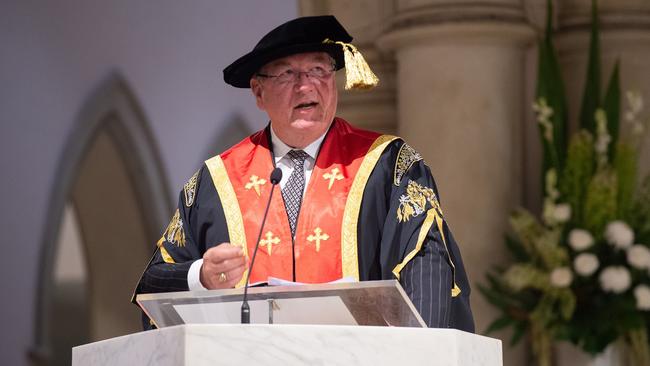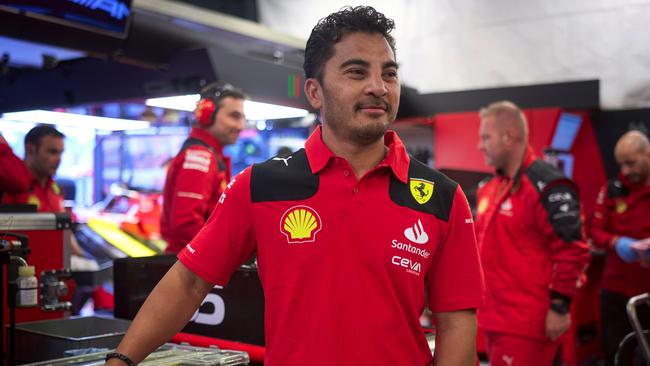Odd ACU move just a fait accompli; Billionaire Escalante about to be acquainted with RICO

It was just past 1pm on Thursday that the Australian Catholic University blasted out a message to students and staff hailing the reappointment of Vice-Chancellor Zlatko Skrbis, the white smoke practically billowing from ACU’s Tenison Woods House in North Sydney.
We published a spoiler alert this week saying Skrbis would be reappointed. We knew that because ACU Chancellor Martin Daubney had already given his benisons to a renewal of Skrbis’s contract, and so Thursday’s meeting of ACU’s governing Senate body – allocated the task of rubberstamping the reappointment – was destined only to be a formality.
If it’s a sign of just how tokenistic their input was, the email announcing Skrbis’s five-year extension was actually written the previous evening.
So, this was always going to happen – we knew it, the staff knew it, Daubney and Skrbis knew it – and yet the news is still mind-boggling to conceive even with the weight of predictability and expectation freighted with it.
The truly shameful part of the announcement is the bit that says Skrbis’s extension “will ensure stability for ACU, and it will enable ACU to accomplish its mission as a Catholic university …”
Anyone who’s followed the happenings at ACU and watched it turn into a sink of infamy will recognise the madness, the blatant dishonesty, of that absurd statement. Stability at ACU? You would have found greater stability on the Costa Concordia before it crashed. Redundancies at the university have completely demoralised staff and resulted in legal action, but those alone haven’t trashed its reputation.

Skrbis’s bumbling earlier this year saw him appoint, then terminate, the university’s Dean of Law, Professor Kate Galloway, because her left-wing views on abortion didn’t fit the conservative mold of the university. That’s not her fault – Skrbis shouldn’t have appointed her in the first place! More than $1m in taxpayer funds were spent to clean up and compensate Galloway for the mess caused, and to draft a confidential legal settlement to keep it all quiet.
Is that stability and good governance? Does wall-to-wall coverage of the university’s cowardly mishandling of a speech given by former union leader Joe de Bruyn exemplify what stability looks like to Daubney and the Archbishop of Brisbane, Mark Coleridge, both of whom put their signatures to the email heralding the VC’s reappointment?
People with long memories will recognise the name Coleridge. He’s been known to put his name to many things – even other peoples’ work!
Skrbis’s dedication to ACU’s mission as a Catholic university? It’s led to a breakdown of relations with Sydney Archbishop Anthony Fisher, who last month voiced his shame about ACU management (over the de Bruyn matter) in a six-page letter to Pro-Chancellor Victoria Bourke (with Skrbis and Daubney carbon-copied).
ACU maintains a bizarre and petty need to smear the truth out of existence with every public utterance it makes, which is why a spokeswoman told The Sydney Morning Herald this week that neither Daubney nor Skrbis were CC’d as described. Well, we’ve got the letter – and they were CC’d.
We’re not even complaining about the little lie they told; it’s just another small white lie from ACU management. They’ve told bigger ones over the termination of Galloway, and over the treatment of de Bruyn, as Fisher noted in the letter he sent.
When the Archbishop himself is calling BS on the public ass-covering by a university he’s been associated with for years, well, that’s not a great sign of stability and leadership.
Only someone freshly out of a lobotomy would be of a mind to describe the parlous state of ACU management as “stable” or in line with the university’s mission. Senior officials in the bloody Vatican (!) are asking questions of ACU’s commitment to its religious identity.
You’d think Skrbis would have been excommunicated over the shambles! Now? He’s getting a victory lap and five million bucks. YB
Splendour in the grass
A special opportunity for special individuals: pay $150 to be guided on to the Melbourne Cricket Ground for a 30-minute private audience with … wait for it … the turf curatorial team. That’s right, pay good money to learn how the MCG’s playing surface is kept “in peak condition all year round”.
In other words, yes, pay money to see the grass grow!
“Gain exclusive insights into the work behind maintaining the pitch, from grass selection and seasonal care used to keep it in peak condition year-round,” states the offering from the Australian Sports Museum, and sent to members of the Melbourne Cricket Club.
What next? Bunnings offering a tour of its paint selection? Marvel at the colours! Watch them dry!
Ugh. YB
Escalante in court
Another day, another lawsuit for Laurence Escalante’s online “social casino” empire, this time dragging in Apple and Google in a racketeering complaint against the Perth-based gaming billionaire’s Virtual Gaming Worlds business.
The latest lawsuit, filed this week in New York – which has some of the toughest anti-gambling laws in the US – uses the notorious Racketeer Influenced and Corrupt Organisations (RICO) statutes to allege VGW illegally promotes gambling in the state.
As a quick refresher, Escalante’s VGW turned over about $6.1bn last year through its gaming products – such as Chumba Casino, Luckyland Slots and Global Poker – by getting punters to pay to bet on fake pokies with fake money. The kicker is that VGW also runs sweepstakes for real money prizes – buying fake money (with real dollars) also gets you sweeps coins, which could be cashed in for real prizes.

It’s been a wildly profitable business model, given VGW posted a $490m profit last year. It has also provided a neat way to avoid pesky laws restricting casinos and gambling in many US states, and avoiding gambling regulators in those that do. But the model has come under increasing legal threat in the US. Despite “iron-clad” clauses in its terms and conditions that force most aggrieved punters into arbitration, VGW is currently facing nine class action suits in US federal courts and plenty more in various state courts. Most allege that VGW – and other operators – are just running an online casino under the cover of the sweepstakes model.
VGW is also facing a concerted lobbying effort from casino and online sports betting companies, who want it banned – or at least licensed and taxed.
VGW has seen off a wave of similar lawsuits – it has so far settled only one, in Kentucky, for about $US12m.
But the latest round seems to pose a new threat. The New York suit drags in the Google and Apple app stores, both for allowing VGW’s casinos on their platforms, and for processing payments. VGW’s mobile apps drive only a fraction of the company’s revenue, so even if Apple and Google get the wobbles it probably won’t matter much.
But the greater risk is that the suit is the second in recent months to target one of VGW’s payment processing companies, after Wordpay was joined to a Florida lawsuit against VGW.
It’s also worth noting that VGW has withdrawn its sweepstakes offerings from five US states – Connecticut, Idaho, Michigan, Montana and Washington – after legal threats from state regulators.
But, as a VGW bugle said, it’s also pretty easy to file class action lawsuits in the US, and applicants can say pretty much whatever they want in the statement of claim.
“We have full confidence in our compliance with all laws and regulations where we operate, and remain confident about the future,” he said. NE





To join the conversation, please log in. Don't have an account? Register
Join the conversation, you are commenting as Logout